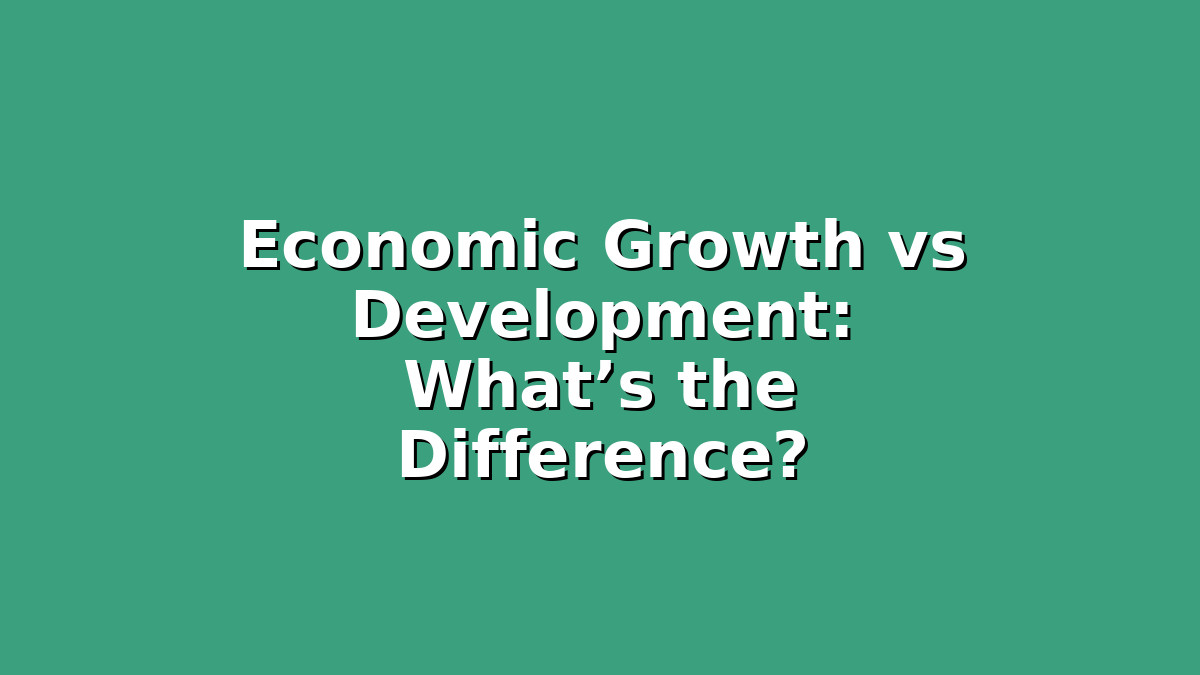When preparing for exams, especially in subjects like economics, geography, or social studies, understanding key concepts clearly can make a huge difference in your scores. One topic that often confuses students is the difference between economic growth and economic development. While these terms sound similar and are related, they represent different ideas and have distinct implications for a country’s progress. In this article, we’ll break down what economic growth and development mean, why they matter, and how you can study these concepts effectively. Let’s dive in!
Understanding Economic Growth: The Basics and How to Study It
Economic growth refers to an increase in a country’s production of goods and services over time. It is usually measured by the rise in Gross Domestic Product (GDP) or Gross National Product (GNP). When a country experiences economic growth, it means its economy is expanding, producing more output than before. This is generally a positive sign, as more goods and services usually mean more jobs, higher incomes, and better standards of living.
Key points to remember about economic growth:
– It is quantitative: measured by numbers like GDP.
– It focuses on output and income.
– It does not account for how wealth is distributed or the quality of life.
Study tip: When preparing for exams, focus on memorizing definitions and indicators of economic growth. Use real-world examples such as China’s rapid GDP growth or India’s expanding tech industry to illustrate your points. Practice explaining how GDP is calculated and what it shows about a country’s economy. Creating flashcards with terms like GDP, GNP, and per capita income can help reinforce these ideas.
Economic Development: A Broader Perspective and Study Techniques
While economic growth is about increasing the size of the economy, economic development is a much broader concept. It refers to improvements in the overall quality of life and economic well-being of people in a country. Development includes economic growth but also considers factors like health, education, equality, environmental sustainability, and access to basic services.
Key aspects of economic development:
– It is qualitative: focuses on quality of life.
– Includes social and economic indicators such as literacy rates, life expectancy, poverty levels, and gender equality.
– Takes into account sustainable and inclusive growth.
Study tip: To understand economic development deeply, try comparing it with economic growth using Venn diagrams or charts. Highlight how a country can have high economic growth but low development if wealth is unevenly distributed or if many people remain poor. Practice writing short essays or paragraphs explaining the Human Development Index (HDI) as a composite measure of development. Using case studies like the Scandinavian countries or sub-Saharan Africa can make the concept more tangible.
Linking Economic Growth and Development: How to Approach Exam Questions
It’s important to understand that economic growth and development are linked but not synonymous. A country might experience economic growth without significant development, meaning its citizens may not feel better off despite higher national income. Conversely, some development efforts might focus on improving education or health first, which can eventually lead to sustained economic growth.
How to tackle exam questions on this topic:
– Read the question carefully to see if it asks about economic growth, development, or both.
– Define the terms clearly before answering.
– Use examples to support your points.
– Explain the limitations of economic growth as a measure of prosperity.
– Discuss the importance of development indicators like HDI and poverty rate.
Study tip: Practice answering past exam questions or creating your own questions. Summarize your answers in bullet points to ensure clarity and completeness. Discuss your answers with classmates or teachers to gain different perspectives and improve your explanations.
Conclusion: Mastering the Difference for Exam Success
Understanding the difference between economic growth and economic development is crucial for your exam preparation and overall knowledge. Remember, economic growth is about increasing output and income, while economic development encompasses the broader improvements in people’s lives and well-being. By focusing on key definitions, using examples, and practicing past questions, you can confidently tackle this topic in your exams. Keep your study sessions balanced—combine memorization with critical thinking—and don’t hesitate to use diagrams or real-life case studies to reinforce your understanding. With consistent effort, you’ll not only master this concept but also gain a deeper appreciation of how economies evolve and impact societies.
Good luck with your studies, and remember: clear understanding and regular practice are your best tools for exam success!

Responses